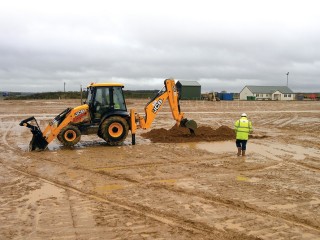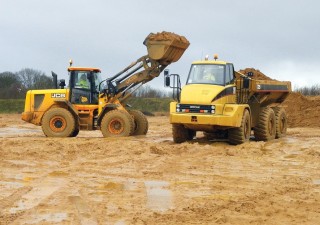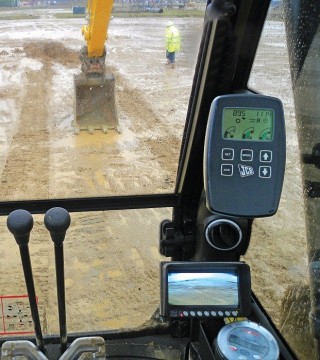The fuel fed into excavators, dozers, loaders, dump trucks, telehandlers and other machines used during the groundworks and construction phases of a construction project account for a third of the project’s total carbon emissions. And with financial and environmental pressures increasing year-on-year, the need to reduce fuel usage has never been greater.
For their part, machine manufacturers are rising to the challenge by, for instance, developing hybrids and introducing features such as slow idle, auto shutdown and Eco modes. However, the operator still remains the biggest single influence on fuel consumption. The advent of telematics systems allows good operator practice – in terms of fuel efficiency and productivity – to be better defined and this is being fed into the training for new plant operators. These good practices are also being fed into a new generation of ‘eco operator’ courses designed to get experienced operators up to speed with the latest thinking and technology.
To find out what was involved, and if it was a worthwhile exercise, The Construction Index joined one of these special ‘eco operator’ courses that are now being run by several plant manufacturers. In this instance the course was run by the National Construction College (NCC) in association with JCB at Bircham Newton in Norfolk.
The first question to senior instructor Chris Blake was: Why should employers enrol operators with years of experience on one of these courses?
“Blue CPCS card holders are competent operators; they know what they are doing and how to do the job safely. But machines have changed so much over the last few years and operators who have not been instructed on these latest functions may not be getting the best out of their machine,” he says.
Crispin Turner from JCB highlights the example of the new low emissions engines developing more power and torque at lower revs. “I’ve been out to customers on the 360 Eco who say they are not achieving the 15% fuel savings we quote,” he says. “When I sit in the cab the engine is running at 1900rpm and, when I ask why, they say ‘that’s what we’ve always done’. When it is dropped back to 1700rpm the performance is the same and fuel savings become apparent.”
JCB and the NCC have worked together to offer eco operator training on four types of machine – excavators, backhoe loaders, wheel loaders and telehandlers – which account for the majority of plant on most construction sites. The one-day course costs around £175 and operators can train on one or two machine types during the day. “An operator from a quarry might want to do the 360 and the wheel loader whereas for construction it could be the excavator and the telehandler,” says Blake. Our day started with each of the four participants selecting one of the JCBs, all of which have been specially retrofitted with a sensitive fuel consumption meter. Having collectively chosen the JS220 excavator, each participant then performed a particular task (digging a trench, positioning bricks or loading an ATD) in the normal way. Our fuel usage was recorded and we made our way to the classroom to be taken through areas where fuel can be saved without compromising productivity.

For each machine there are a number of fuel-saving steps – some of which are common. These include selecting the correct type and size of machine, letting the machine warm up before starting work, not idling for long periods and selecting the correct operating mode for the work in hand.
According to Blake, as many as 80% of machines currently working on site have had the Power mode (or equivalent) selected ever since they first entered service and have never been reset. In the case of the very latest JCBs, the electronics will default to Eco mode if the ignition has been turned off for more than 90 minutes although this is not the case for most machines currently in service.
Other fuel-saving tips for excavators include digging a trench in several layered cuts instead of trying to dig to depth in a single bucketful, and curbing rapid accelerations/decelerations.
Tips specific to individual machines include avoiding wheel spin on the shovel and positioning the dumper correctly for fast and efficient loading, ensuring the correct steering mode is selected on telehandlers and engaging two-wheel drive when roading telehandlers and backhoe loaders. When repeating the morning’s exercise later, we each employed the best practice techniques discussed in the classroom. The results were surprising. The JS220’s Eco mode was selected (instead of Auto), which in Bircham Newton’s sandy soil was more than adequate for the task in hand.
In Eco mode the machine was far smoother to operate, more precise on the return to trench and prevented the uncurling bucket slamming against the stop. The combination of layered cuts, the more suitable Eco setting and better positioning of the deposited spoil saw the job done more quickly (and more comfortably) than with the first run and, most of all, requiring 37% less fuel. Every delegate was more economical on the second run, cutting fuel usage by between 30% and 43%. While impressive, these figures are not representative of experienced full-time operators, who typically achieve savings of around 15%.
Turner calculates that, with red diesel around 67p per litre, the fuel savings likely to be achieved by most professional operators would pay back the course fees in around a month – or perhaps two months if the operator’s wages for the training day are included in the calculation.
“Bigger contractors might like to send some of their operators on the course and quantify the savings to decide whether the others should attend,” Blake suggests. He says the NCC’s courses, which run at Bircham Newton and at NCC Central at Ashbourne in Derbyshire, are equally applicable to operators of other makes of machines. While the initial four categories (excavators, backhoes, wheel loaders and telehandlers) cover the majority of machines used on site, the NCC is also considering adding Eco courses for dump truck and dozer operators.



